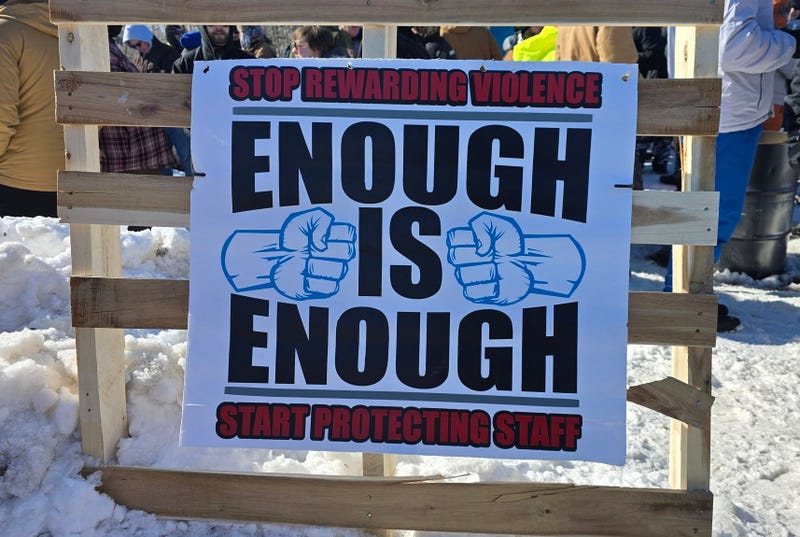
Buffalo, N.Y. (WBEN) - Over the last couple of days, corrections officers at several state-run facilities in New York have taken to the streets in protest of unsafe working conditions at correctional facilities, as well as the inaction of state officials to properly address the problems that are affecting so many at these prisons.
Corrections officers at Collins Correctional and Elmira Correctional facilities went on strike Monday, while others at Attica Correctional, Wyoming Correctional and Wende Correctional joined the strike on Tuesday. Guards taking part Tuesday told WBEN there are no plans to end their strike until safety is guaranteed.
Knowing how this strike by corrections officers is illegal under Taylor Law, local labor expert Art Wheaton from Cornell in Buffalo feels it's a brave movement from these state workers.
"They're not allowed to go out on strike, so this is not being sanctioned by the union. NYSCOPBA has not authorized this strike, but the members feel it's so important, they have no other choice than to try to get Albany's attention to make some changes," said Wheaton in an interview with WBEN.
With these corrections officers not technically being able to strike, Wheaton says there are other ways to deem these actions.
"You can call it a wildcat strike, because they don't have the union's authorization. You could call it informational picketing, which is also what they have. Another generic term is a work stoppage. But the biggest thing is it's a protest, saying that the working conditions are unsafe and unhealthy for them inside the corrections facilities. And from what I've heard, I don't disagree with them. Some of these things are pretty horrible conditions," Wheaton said.
In conversations with corrections officers picketing outside Wende Correctional Facility on Tuesday, one guard says he and others taking part have resigned from the union in order to strike and call for action from Albany.
Wheaton says resigning from a union is acceptable for any worker, but anyone who does so will still have to pay an agency fee, which is the almost equivalent of union dues. However, he feels there's no real benefit from doing such a thing.
"The benefit is being in the union so you have collective bargaining. But at this point, the conditions are they can be forced to work mandatory 24-hour shifts, and if you're getting forced to work inside a correctional facility for three eight-hour shifts in-a-row, by force, sometimes the union status is not your biggest priority," Wheaton acknowledged.
A large scale strike such as this from corrections officers in New York has been seen before, according to Wheaton.
"Teachers have gone out on strike, even though in New York State, the public sector teachers are not allowed to go out on strike. But for most of those, it's a union-sanctioned strike for the teachers. This one is not authorized by the union, but it's got a similar issue," Wheaton explained. "What helped end some of the teacher strikes was the pressure put on by parents of the kids talking to their legislators or board members, saying, 'Hey, this is unfair. We really need to make changes.' For the corrections officers, this is getting Albany's attention, because at all of these facilities, they have stopped all visitation. So it's family and friends that can't go visit their loved ones inside the correctional facilities that could put more pressure on Albany saying, 'Hey, we need to solve this.'"
While New York Gov. Kathy Hochul plans to deploy members of the National Guard to correctional facilities statewide on Wednesday if strikes by corrections officers have not ended, Wheaton feels it won't deter many guards from continuing to make their voices heard.
"It also means that if they get to a crisis situation for the people inside that are working double or triple shifts, it's possible they could have some of the National Guard fill in on some of those shifts in the meantime. But there's no way Gov. Hochul is going to say, 'The National Guard is going to be a long-term solution for trying to keep up with the workplace.' They're not going to be able to have the National Guard deployed inside corrections facilities for the long-term," Wheaton noted. "But it does mean that could reduce emergencies or a major crisis, or an uprising in the prison itself, or the corrections facility itself, with more of a military or National Guard presence there."
Wheaton points out that the actions of Gov. Hochul is an indication that the corrections officers have, at the very least, gotten her attention.
How long does Wheaton, perhaps, see these strikes among corrections officers lasting across the state? He feels it may continue to be an issue until it's properly addressed when politicians return to session next week.
"It could take something from New York State, who's the employer in this case, to make those changes, unless they have an emergency session. But it may take an act of the New York State Legislature to try to resolve this issue," Wheaton said.

